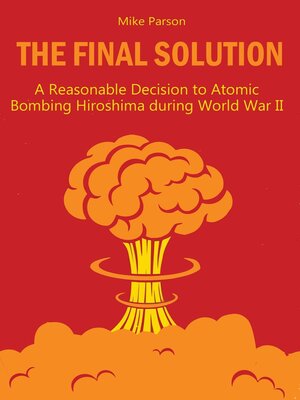The Final Solution a Reasonable Decision to Atomic Bombing Hiroshima during World War II
ebook
By Mike Parson

Sign up to save your library
With an OverDrive account, you can save your favorite libraries for at-a-glance information about availability. Find out more about OverDrive accounts.
Find this title in Libby, the library reading app by OverDrive.



Search for a digital library with this title
Title found at these libraries:
| Library Name | Distance |
|---|---|
| Loading... |
The judgments of historians regarding the atomic bombing of Hiroshima during World War II can be grouped into two opposing camps: those who believe President Truman made the right choice and those who decry that decision, considering that other options were ignored. The motives presented for dropping the bomb were suspect. Many critics of the atomic bombing also argue that the decision failed to meet the "discrimination" and "proportionality" criteria outlined in Just War Theory (specifically, jus in Bello or conduct during the war) and, therefore, must be deemed an immoral act.
In examining whether the atomic bombing was a reasonable decision, this book analyzes the critical variables and competing interests that President Truman considered and concludes that the atomic bombing was a sensible and rational choice and, therefore, reasonable. In determining whether the atomic bombing of Hiroshima was a just decision, this thesis examines that fateful decision through the prism of Just War Theory and the Natural Law traditions of the individual's Right to Life and the state's Right to Independence and concludes that it was a just decision.
The detailed review and analysis of the history behind the Hiroshima bombing reveal that President Truman was a prisoner of circumstances that existed in the summer of 1945. The options available to him were distressing. His decision to drop the atomic bomb on Hiroshima, considering the dire situation, was well within reason and, admirably, proved prescient.







